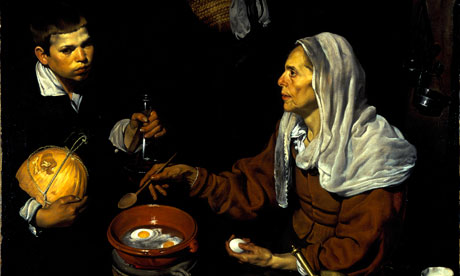Spain is accomplished in the art of decline. At its most powerful, it had economic problems just as difficult to conquer as those of today. And they are mirrored in some of the greatest Spanish art.
In Diego Velázquez's painting Bacchus, the supreme Spanish master of the 17th century portrays the god of wine among a group of real life, mortal drinkers. They look poor and disenfranchised, but the booze makes them happy for a while. It shows an eye for poverty and outsiderdom that also made Velázquez portray a street water-seller and the dwarf-entertainers of the royal court.
Spain had a world empire when Velázquez – who was born in 1599 and died in 1660 – was painting his ironic and melancholic pictures of real life. Yet the reality he records is one of decline and poverty. Spain's galleons of gold and silver from its colonies in the New World failed to buy it a place in the economic rise of modern Europe: the beneficiaries of expanding global trade in the 17th and 18th centuries were the Dutch and British with their merchant ships, sophisticated banks and busy exchanges.
Southern Europe was getting left behind in the Baroque age, just as it is now. In fact, the cruel grinding wheels of economic inequality now ravaging the continent were put in place five centuries ago, when new trade routes in the Atlantic and Pacific put paid to the mercantile leadership of Mediterranean Europe. This is reflected in Italian as well as Spanish art. In Caravaggio's late paintings – as he travelled the south on the run for murder – we see a world of poverty and dirty feet: Jesus born in a very tough stable.
It is fascinating, and disturbing, to see how stereotypes of European differences we thought we'd outlived are coming back. The northern Protestant capitalist work ethic now seems epitomised by prosperous Germany, while the southern countries are in trouble. But it was geography and historical chance that mapped the economies of Europe. In the late middle ages, Britain's spendthrift kings were bankrolled by ingenious Italian bankers. It would be absurd to see Tudor England as more economically realistic than Medici Florence. All the art of Florence bears witness in its dazzle to Italian economic enterprise.
The south does not "deserve" to be in trouble. But it is. Who's next?











